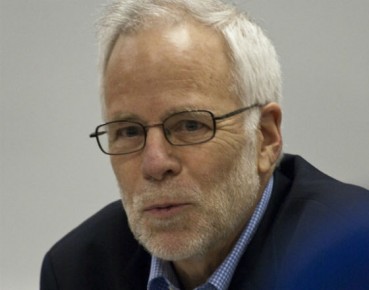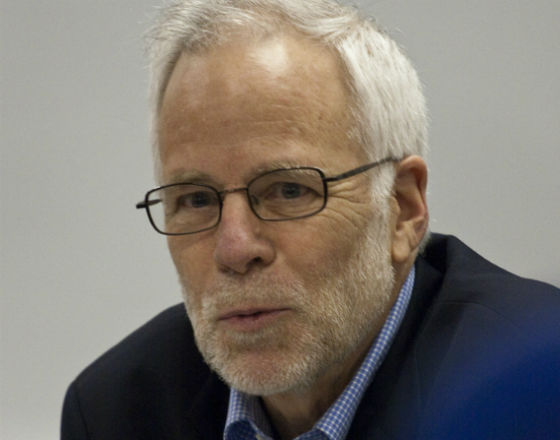Russia is too small to win the war in Ukraine
Category: Macroeconomics

Barry Eichengreen (CC-BY-NC-2.0-Yan-Chi-Vinci-Chow)
After an initial collapse following the attack on Ukraine, the ruble exchange rate recovered more than fully. On Friday, April 29th, the currency actually hit a two-year high against the U.S. dollar, this despite the fact that the greenback has itself been surging on the foreign exchange market. The Russian finance ministry was able to make regularly scheduled payments on a $565 million Eurobond due this year and a $84 million Eurobond set to mature in 2024 – both payments denominated in dollars. Western sanctions are supposed to prevent Russia from accessing and utilizing dollars. These developments seemingly raise doubts about their effectiveness.
In fact, the behavior of the ruble is not hard to explain. Initially, the exchange rate collapsed because of capital flight, as investors, seeing the door about to close, rushed en masse to convert their rubles into euros and dollars. Then the door slammed shut as expected; in other words, the Russian authorities imposed capital controls. With capital flight curtailed, further downward pressure on the ruble was minimized.
Meanwhile, the Russian central bank raised interest rates to 20 percent. This was not enough to attract back flight capital, but it at least blunted the incentive to attempt to evade the capital controls and shift additional funds abroad.
Finally, the ruble and the Russian economy generally were supported by continued sales of oil and gas. Putin’s government cleverly asked purchasers to pay for their imports in rubles. This forced them to purchase rubles using dollars and euros, supporting the Russian currency.
Those same energy purchases are what made it possible for Russia to service its two Eurobonds at the end of April. There is considerable confusion about this point. No less an authority than the Financial Times newspaper reported that “A US official said that the debt payments announced on Friday were made using dollars that were in Russia.”
This is a misunderstanding. There are no dollars in Russia, aside from any $100 bills secreted in the Kremlin and in the homes of Russian oligarchs. In the past, Russia held its dollar reserves in the form of U.S. treasury securities. These are not paper certificates kept in a safe-deposit box in a bank of the holder’s choosing. (The U.S. Treasury discontinued the issuance of these so-called bearer securities in 1982.) Rather, they are electronic instruments recorded by a U.S. custodian, either the U.S. Treasury itself or licensed government securities brokers and dealers. Any financial institution seeking to sell them on Russia’s behalf would automatically be subject to sanctions.
The only dollars (and euros, which are of course convertible into dollars) that Russia holds outside the country, and that it can still access, are balances at its non-sanctioned banks with foreign branches and subsidiaries – at Gazprombank’s subsidiary in Luxembourg, for example. (Gazprombank is not sanctioned because, at the time of writing, European countries need its services in order to pay for Russian gas).
Thus, a European government or utility paying for Russian gas asks its bank, or another bank with a correspondent relationship with Gazprombank, to make a payment in euros. The government can borrow those euros from Gazprom. The parties then instruct Gazprombank to transfer a portion of those euros from the account of Gazprom to the account of the Russian government. And the government can then use the latter to pay interest on its Eurobonds.
Notice what makes this work. It is not that the Kremlin has some secret stash of dollars in Russia. Rather, it is that Western Europe is continuing to purchase Russian gas and, to that end, exempts Gazprombank from most of its sanctions. The German Economy Ministry confirmed this exemption for energy-related transactions on April 29th.
The arguments for European countries to stop buying Russian gas, or at least to make their payments into escrow accounts that Russia cannot access while the war continues, are overwhelming. This evidence that Russia is, for the moment, able to make use of those payments to engage in other international financial transactions is yet another argument for a gas embargo.
Assuming Europe does the right thing, namely that it stops buying Russian gas and supplying Moscow with dollars and euros, what options will Russia retain for financing its international transactions? The Russian central bank had been shifting from U.S. treasury securities to gold reserves already before the war; these reported now account for as much as 20 percent of its total reserves. Most if not all of this gold is warehoused in central bank repositories in Moscow, St. Petersburg and Yekaterinburg. In principle this gold can be sold to pay for imports or service external debts.
But Russian gold cannot be sold on the two leading markets, London and New York. Russia might still be able to sell gold on the Shanghai market, the number three trading center. In return it would receive a renminbi deposit in its account at a Chinese bank, which it could use to purchase Chinese exports. Russia was already accumulating renminbi reserves before the current crisis. So it could simply add revenues from its gold sales to these existing accounts. Conceivably, it could convert those renminbi into dollar or euro balances at a U.S. or European branch of one of the big Chinese banks and use them to purchase other imports.
So far, however, Chinese banks have been scrupulous about limiting their business with Russian counterparties, fearing that they might become the targets of secondary sections. Their transactions in euros and dollars, in particular, are vulnerable to discovery by Western regulators. Thus the best Russia can hope for is to use its renminbi receipts to import merchandise from China. And this affords it limited commercial and financial opportunities at best.
Overall, financial maneuvers can do little to help Russia evade the West’s financial sanctions. The main way it escapes them is by selling energy to Western Europe. It is past due time for this to stop.
The article is published in a series of articles in Obserwator Finansowy written by governors of central banks and distinguished economists. The series is under the special patronage of the Governor of Narodowy Bank Polski, Professor Adam Glapiński. The authors of the articles have agreed to waive their fees for writing the texts, and in exchange NBP shall donate the amount equivalent to the fees onto the account of the National Bank of Ukraine in order to support the NBU during the war. Below is a foreword by the Governor of NBP to the whole series:
On 24 February a huge tragedy occurred, in the face of which it is impossible to simply move on as if nothing had happened.
Nobody can remain indifferent to the misfortune that has befallen the Ukrainian nation.
All of us are shocked by the press reports, and particularly by what we see in the mass media.
Fighting Ukraine is not only its brave soldiers, but also an army of thousands of civilians trying to preserve normality in a country stricken by Russian aggression.
This army includes the staff of the National Bank of Ukraine, with whom NBP is in constant contact.
Aware of our Ukrainian colleagues’ needs, we have invited several central bank governors and eminent economists to share their knowledge on the economic processes taking place around the world.
It is rare for such a distinguished group of authors to feature in Obserwator Finansowy, which is published by NBP. It is also worth underlining that all the authors have waived the fees for their articles in order to donate them to meet the needs of our colleagues working in the National Bank of Ukraine.
I believe that you will find the series of these articles interesting, especially since they not only share the knowledge and experience of their authors, but also express goodwill towards the war-afflicted NBU.
Prof. Adam Glapiński, Governor of NBP


